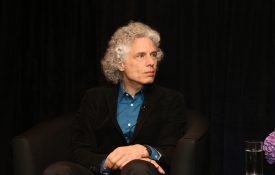-
Bet on the champion’s rival
Analysis of decades of data from college basketball and the major sports leagues (MLB, NBA, NFL, NHL) reveal that a team is more likely to have better playoff success if its archrival did better in the playoffs in the previous year — and especially if it won the championship. This was the case even when controlling for how the team and its rival performed in other years and, in the case of college basketball, the team’s seed going into the NCAA tournament.
-

Steven Pinker’s Work Continues to Dazzle Bill Gates
Billionaire philanthropist Gates is touting his admiration for APS William James Fellow Steven Pinker’s newest book, Enlightenment Now
-
Daniel Kahneman On Misery, Memory, And Our Understanding Of The Mind
Economic theory rests on a simple notion about humans: people are rational. They seek out the best information. They measure costs and benefits, and maximize pleasure and profit. This idea of the rational economic actor has been around for centuries. But about 50 years ago, two psychologists shattered these assumptions. They showed that people routinely walk away from good money. And they explained why, once we get in a hole, we often keep digging. The methods of these psychologists were as unusual as their insights. Instead of writing complex theorems, Daniel Kahneman and Amos Tversky spent hours together...talking. They came up with playful thought experiments. They laughed a lot.
-
Politeness can sometimes hurt more than it helps
Ryan — a brilliant, enthusiastic young scientist — spent a two-year layover in my neuroscience laboratory between his undergrad studies in Vancouver, B.C., and graduate school on the East Coast. On his last day in California, we sat over drinks, reflecting on his plans for the future. I offered some parting advice and then asked the question I pose to everyone who graduates from my lab: “What could I have done better?” He hesitated, then replied, “You’re too nice.” This was startling, especially coming from a Canadian. (I’ve omitted Ryan’s last name to protect his privacy.) “Nice” might count as faint praise, but is it really an insult? I asked him to elaborate.
-

Telecommuting Study Shows Benefits for Many Job Types, No Negative Effects
Teleworkers received higher job-performance ratings if the job was complex, required minimal interpersonal interaction, or if the worker received little social support at work.
-
How to Make Friends as an Adult — and Why It’s Important
Anyone who’s ever made room for a big milestone of adult life–a job, a marriage, a move–has likely shoved a friendship to the side. After all, there is no contract locking us to the other person, as in marriage, and there are no blood bonds, as in family. Friendships are flexible. “We choose our friends, and our friends choose us,” says William K. Rawlins, Stocker Professor of Communication Studies at Ohio University. “That’s a really distinctive attribute of friendships.” But modern life can become so busy that people forget to keep choosing each other. That’s when friendships fade, and there’s reason to believe it’s happening more than ever.

